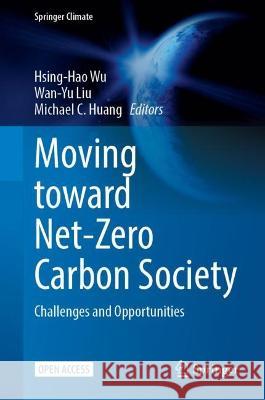Moving Toward Net-Zero Carbon Society: Challenges and Opportunities » książka
Moving Toward Net-Zero Carbon Society: Challenges and Opportunities
ISBN-13: 9783031245473 / Angielski / Miękka / 2023 / 280 str.
Moving Toward Net-Zero Carbon Society: Challenges and Opportunities
ISBN-13: 9783031245473 / Angielski / Miękka / 2023 / 280 str.
(netto: 153,32 VAT: 5%)
Najniższa cena z 30 dni: 154,18
ok. 16-18 dni roboczych.
Darmowa dostawa!
This open access book explores various issues concerning the net-zero emission achievement, ranging from carbon pricing, carbon trade schemes, energy transition, ecological conservation, and carbon sinks, as well as the economic and social impacts of introducing carbon neutral policies in the Asia-Pacific region.The extreme flooding and drought problems, crop yield problems, and habitat changes brought about by climate change have seriously threatened the ecosystem and human survival, forcing people to rethink environmental management policies and limits on economic development. In the post-COVID-10 era, it is indispensable to adopt a more proactive climate change adaptation policy and establish bilateral cooperation with international partners who value climate change. 2021 is a critical year, and the leaders of major industrial countries at the recently concluded G7 meeting jointly stated the common objective seeking the establishment of carbon-neutral international community by the mid of the century. Major carbon-emitting countries or entities such as the European Union, US, Japan, Korea, China, and India have proposed specific timetables for net-zero carbon emissions and carbon neutrality before or at the COP26. Policy-makers around the world would also work closely with scientists, experts, and enterprises seeking appropriate policy instruments such as the development of carbon tax, carbon pricing, carbon sinks, global or regional carbon emission trade schemes, energy transitions, and other carbon-neutral policies moving toward net-zero emission society by the mid of the century. At a time when carbon pricing policies are being formulated, climate change related laws and policies will reshape the global governance and industrial layout during the period of 2021–-2030, and it is critical to move toward energy and industrial transformation, ecological conservation, and sustainable agricultural development.
This open access book explores various issues concerning the net-zero emission achievement, ranging from carbon pricing, carbon trade schemes, energy transition, ecological conservation, and carbon sinks, as well as the economic and social impacts of introducing carbon neutral policies in the Asia-Pacific region. The extreme flooding and drought problems, crop yield problems, and habitat changes brought about by climate change have seriously threatened the ecosystem and human survival, forcing people to rethink environmental management policies and limits on economic development. In the post-COVID-10 era, it is indispensable to adopt a more proactive climate change adaptation policy and establish bilateral cooperation with international partners who value climate change. 2021 is a critical year, and the leaders of major industrial countries at the recently concluded G7 meeting jointly stated the common objective seeking the establishment of carbon-neutral international community by the mid of the century. Major carbon-emitting countries or entities such as the European Union, US, Japan, Korea, China, and India have proposed specific timetables for net-zero carbon emissions and carbon neutrality before or at the COP26. Policy-makers around the world would also work closely with scientists, experts, and enterprises seeking appropriate policy instruments such as the development of carbon tax, carbon pricing, carbon sinks, global or regional carbon emission trade schemes, energy transitions, and other carbon-neutral policies moving toward net-zero emission society by the mid of the century. At a time when carbon pricing policies are being formulated, climate change related laws and policies will reshape the global governance and industrial layout during the period of 2021–-2030, and it is critical to move toward energy and industrial transformation, ecological conservation, and sustainable agricultural development.











